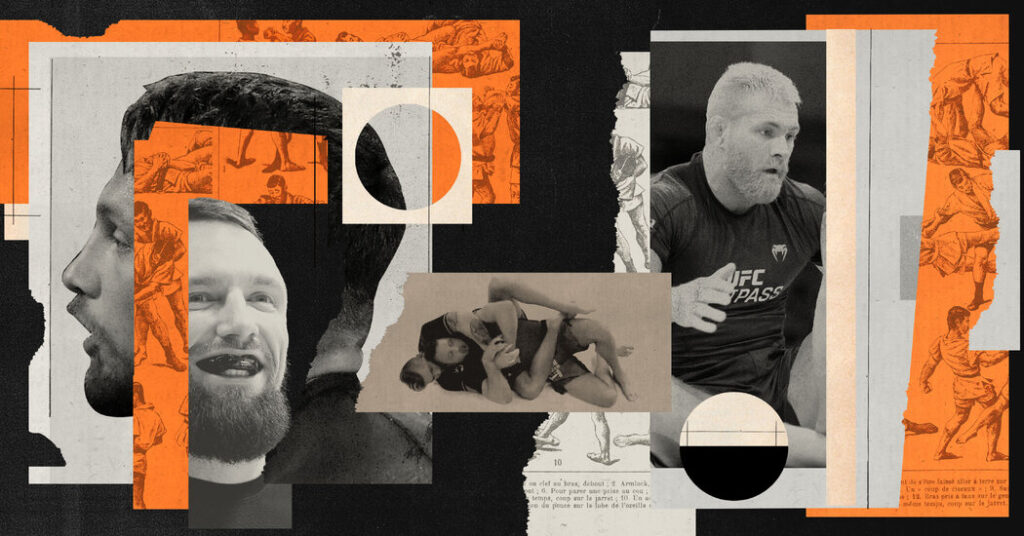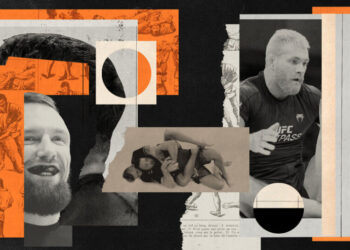A rift is growing in a sport that, depending on whom you ask, is either a bone-crushing, tendon-ripping martial art or just a bunch of people in weird costumes rolling around on the floor. Jiu-jitsu cuts across divides of class, race and creed: Mark Zuckerberg does it, but so do doctors, HVAC technicians and street kids in favelas in Rio de Janeiro. My own training partners over the past six years have included an F.B.I. agent, a glass blower and a doorman at a brothel. For us, the gym is a romper room, a place to exercise our brains, work up a sweat and forget the world. This used to be easy, because no one took jiu-jitsu seriously. Storied matches unfolded before audiences smaller than those at a high school play.
Lately, though, a new faction has appeared: modern-day gladiators, flat-earthers and vaccine skeptics, guys who thrill at the mantra “I am a shark, the ground is my ocean, and most people don’t even know how to swim.” They agree with Andrew Tate that “men’s life is war,” but because they can’t or won’t take up arms in a real conflict, they take their warrior ethos into the training room.
Their hero is Gordon Ryan, maybe the best athlete the sport has ever seen, who marries supreme control on the mats with alarming levels of vulnerable narcissism and hard-right politics. In his prolific internet posting, obnoxiousness is the point: Not only has he taunted his rivals, he has also encouraged one of them to commit suicide; he has belittled the homeless and, on YouTube, has driven his truck to the Southern border with a rifle to joke about “picking off illegals.”
Standing opposite him is Craig Jones, the self-proclaimed “world’s second-greatest grappler,” a quick-witted Australian known for prancing around in tiny bathing suits and tie-dyed T-shirts with the motto “Keep Jiu-Jitsu Gay” on the front. Though the two are former teammates, Jones split from Ryan’s squad acrimoniously in 2021, and social media bickering quickly ensued. Jones’s taunts included challenging Ryan to an I.Q. test, insinuating that he can’t read and having witches curse him in Romania. Ryan couldn’t resist firing back, generally in long tirades full of grousing. Ryan has thrice bested Jones in competition; online, you could argue he hasn’t won a confrontation yet.
Jones summed up his philosophy regarding rival athletes on his own podcast: “Their full-time job is jiu-jitsu; that’s their passion in life. My passion in life is [expletive] with people on the internet.” He has used social media to skewer the self-regard of almost everyone who has crossed him and in the process has brought the sport back down to earth. Denouncing the “weird cultlike figures and leaders in the sport,” he urges fans to “stop listening to your Navy SEAL podcast, get out of the ice bath” and enjoy their “adult karate.”
Both athletes face a problem: As a pure sport, jiu-jitsu will always struggle for attention. For most viewers, the matches are too complicated and too boring; I’m currently watching a four-hour instructional video on “scientific gripping,” to give some sense of the tediousness of its small movements. Ryan’s approach, apart from technical prowess, has been to go all-in on reactionary white-male grievance. This won him almost a million Instagram followers and an invitation to Donald Trump’s inauguration, but it has also made him the butt of Jones’s mischief. Jones has gibed about Ryan’s alleged sexual preferences and raffled off Ryan’s former car after clandestinely buying it. When Ryan posted about a stomach ailment with a photo of himself looking haggard, Jones used it to plug his sponsor, the hormone-therapy company Evertitan.
Jones’s provocations flip the scripted approach of, say, the W.W.E., with real-life drama bringing eyes to bona fide competition. His humor isn’t for everyone — he once went viral for introducing U.S. audiences to “nose beers,” the Australian slang for cocaine. But while his clowning may not be wholesome, it’s a much-needed corrective to the “epidemic of alpha males” he sees threatening to take over jiu-jitsu.
It once felt virtuous to be the kind of person who said, “I don’t care about drama on the internet.” Later, it looked like a leftover luxury from when old mass media still reigned. Nowadays, it’s a kind of dereliction. The internet is where our moral battles are fought — in politics, in sexual ethics, in visions of the good life. And it’s time to admit that with this shift comes the end of subtlety, deliberation and notions of civility. Only a better troll can beat a troll.
In recent years, many have accepted that being informed means paying attention to political influencers like Hasan Piker on the left and Candace Owens on the right. But is that reason enough to care about the chronically online figureheads of a sport whose main demographic, to quote another Jones zinger, is “recently divorced guys trying to get back in shape”? Yes, I’d say: Jiu-jitsu and mixed martial arts are among the many subcultures that increasingly regulate the vibes flowing into politics, rather than the other way around. And if Gordon Ryan is going to push George Floyd conspiracy theories and inveigh against immigrants, it’s important to have a Craig Jones working the social media levers from the other end.
Labor rights, gender equality, the nefarious effects of monopolies — these affect sports as they do society, and Jones’s trolling addresses all of them. For years, promoters used “visibility” as an excuse to underpay athletes. These same people paid women far less, claiming without proof that they didn’t attract viewers. To show them up, Jones started his own tournament, the Craig Jones Invitational, with $2 million in prize money, dream matchups for hard-core fans and the first “intergender world championship,” pitting Jones against Gabi Garcia, jiu-jitsu’s most decorated female competitor. Not only did his athletes get compensated, but other organizations were compelled to do better.
C.J.I. is now on its way to becoming the most successful franchise in jiu-jitsu. (The U.F.C. has a knockoff with better numbers, but some suspect that it artificially inflates views.) In the meantime, Jones has stepped away from the mats to promote his work with the Guardian Project, which runs gyms for poor children across five continents. Taking on the role of a “low-I.Q. Anthony Bourdain,” he has vlogged from more than a dozen countries, including the Philippines, Ethiopia and Peru. One day, he’s dressed as Santa in fur-trimmed booty shorts giving gifts to kids in Balinese slums; the next, he’s getting shot at in Ukraine, where he has given charity seminars to raise money for soldiers. Some wear their politics on their sleeve; Jones has his on his thigh, where he got an MS-13 tattoo as a “travel hack” for an “all-expenses-paid trip to El Salvador” in mockery of Trump’s deportation policies.
Jones’s health has suffered from years on the road, steroids and valiant ingestion of drugs, and after the second edition of C.J.I., he threatened to disappear for a while. The limelight must have been getting grim, and the stresses of promoting began to show. Jones quit his former team, posting fan art of himself as a deadbeat dad running out on his family. A brief social media silence followed, and fans feared that the fun might be over. But he soon popped back up in Culiacán, the home base of the Sinaloa cartel, posing as the fictional narcotraficante “El Gringo Blanco Loco” and training with the local kids. A fan said she had followed him for his “business journey” but now wanted “to do copious amounts of blow and take shots of taka vodka in the back seat of a stranger’s car in Vietnam.” This probably won’t land Jones on a Wheaties box, but in jiu-jitsu, you take the heroes you can get. Rarely have devotees of a sport been so grateful to someone who has worked so hard to make an absolute joke of it.
Source photographs for illustration above: Screenshot from YouTube; Gregory Payan/Associated Press; Chris Unger/Zuffa LLC, via Getty Images; iStockphoto/Getty Images.
The post The Athlete Trolling His Way Through Jiu-Jitsu’s Culture Wars appeared first on New York Times.




